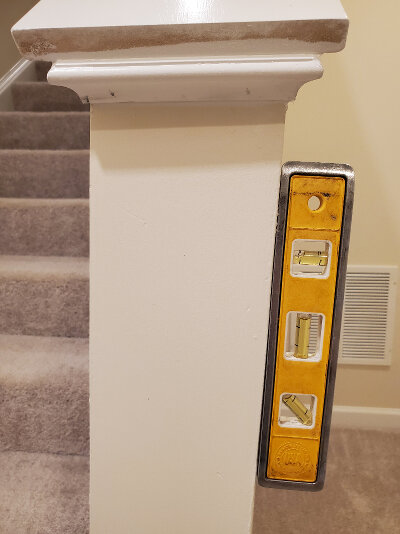A Home Inspector’s Guide to New Home Construction
The suburbs. Where the skies are a palace in an alley!
New is exciting. And based on absolutely no research, I imagine that the potential of new stimulates some part of the brain that has a huge influence on the rest of our grey matter. It makes sense that the allure of a new house, for many people, is psychological magnetism. Come on. It’s a new house. Everything will work, look good, and even smell nice. Your friends will be awestruck. Your parents will finally deem you responsible. Perhaps most importantly, you aren’t inheriting anybody’s old anything. A new house irrefutably proves that you have achieved.
Right?
As a home inspector who routinely inspects both during construction and soon afterwards, I can tell you that having a new home built can be a fantastic, rewarding experience that you will reflect on fondly for years to come.
It can also be a nightmare.
I have worked with clients who have been turned into proverbial camels, a straw or two away from being broken by the home-building process. Too many folks have called me because they feel helpless or like they have lost control.
So what makes the difference?
Is it a certain builder? Is it a type of house? Do new houses carry only the sheen of fool’s gold?
I sincerely hope that I am not the first person to tell you that nothing in life is guaranteed. Every forecast available can confirm that it will be sunny and seventy until it’s fifty and rainy. Nevertheless, I want to use my experience to put you in the best position to have a successful, positive experience with the new construction process. [1]
Get a real estate agent.
More than a few national and regional tract builders offer everything you need to buy a house without an agent, independent mortgage lender, home inspector (ahem), or any of the other people and institutions you traditional bump elbows with when buying a house.
Push back against this.
Arm yourself with professionals who know the business. Tract builders aren’t evil, but no small part of that business model is predicated on speed. The faster you can be brought into the fold and housed, the sooner the builder’s obligations to you will be complete, allowing them to move onto the next customer.
Establish a relationship with a real estate agent first. Some if not most builders will not let you bring one in once you have contracted with them.
Hiring a real estate agent is the most proactive thing you can do to establish some control over the building process.
Real estate agents know the process, language, and what the builder’s obligations are. Don’t wander off into the jungle without a guide.
And yes, they need to be paid for their expertise and work, but you’re buying a home. If an agent helps to ensure that your house is built properly and delivered on time, they may well have saved you money. Don’t be cheap. For most folks, a house is the largest purchase you will ever make.
Thank goodness they are numbered!
Participate and Ask Questions
Even if you can’t make it to the site, take an active role in the building process. Ask for reports, pictures, and updates. Does your builder know how to build a house? Yes. However, to turn out houses as fast as possible, the dance necessarily has to involve lots of sub-contractors and precise coordination. And, yes, toes get stepped on. A lot.
You don’t have to be in the trades or real estate to ask smart questions. If you think something is awry, don’t hold your tongue. Too many folks don’t say anything because they don’t think they have credibility or will sound dumb in front of professionals. I get that. Try this: ask your contact (supervisor, project manager, Sherpa, etc.) questions that lead to an explanation of how thing work:
Why is this wall getting framed before this one?
What keeps the lumber from warping when it gets wet?
Help me understand why I can’t have a sink under this window?
You get the idea. Trust me, you will belabor the process by just announcing that something is wrong – even if it is obviously wrong. Like, say, roughed-in plumbing for a toilet in the kitchen… (My job is not boring.) Be polite – genuinely polite and aim to initiate conversation.
But what if the supervisor is just lying to me so I quit pestering? Great question. Yes. This happens. I have met fantastic supervisors and others who were overmatched or had a different skill set. If you think an explanation is incorrect or inadequate, ask for a response in writing. Documentation is a very important part of having a home built.
The builder tells you that the window flashing doesn’t need to go all the way over the sill? Please note that in an email. That big hole in the sheathing is ok? Please note that in an email. It’s really ok that this duct bends like that? Please note that in an email.
Be clear that you expect accountability.
Do you run the risk of being annoying? Absolutely. But you’re buying a house. This is not a secondhand bike or even a car. Most of us pay for our homes over decades. From that perspective, who cares if the supervisor thinks you are needy. And politeness takes a lot of the edge off neediness.
The folks I know who have been the most satisfied at the end of the building process are those who took an active role.
People Make Houses
The best new house and the worst new house I have inspected were one lot apart. Same builder. Same model. The difference? Different supervisors. One had control of the build and high expectations. The other, obviously, did not. Supervising a build is not an easy job. These folks have to coordinate armies of subcontractors, stay quality control, answer buyers’ thousands of questions, and often have to keep a handle on supply chains. Oh. And sometimes it rains for like three weeks straight.
But just like a coach on the sidelines or a teacher in a classroom, the supervisor is the person who sets the tone for everyone else who will be working on your house. It follows that you need to be clear about your expectations with the person who will be overseeing the project. If you meet a supervisor who doesn’t listen, talks over you, or is unresponsive. Hit the brakes immediately. (This is where having a real estate agent might come in handy.) This is not a pithy way of encouraging you to go around overthrowing supervisors. What I am telling you is that when I talk to buyers who are disappointed or just plain mad at their supervisor, it is usually clear that the relationship ran off the tracks (tracts?) early on.
Articulate your expectations. Foster communication. Be professional and business-like. Having a house built is a business interaction. Most importantly, be polite. Your office job or salary does not entitle you to look down on folks who work outside. If you think of your supervisor as someone who barely has the discipline to put on pants consistently, the relationship is going to be contentious.
Post-build reviews are standard for almost all tract builders these days. Ask your builder how that process will take place. Let everyone know upfront that you’re looking forward to taking part in the review process which – by the way – does not have to be punitive.
I want off the roller coaster!
Hire a Credible Home Inspector
Bet’cha saw this one coming.
Still, it is important to state why. After all, the municipality in which your house is being built will have its inspectors review the house as well.
Here I could regale you with a thousand tales of broken trusses, walls so out-of-plumb they could induce vertigo, an entire electrical system that was ungrounded, plumbing running through HVAC duct work, or, as mentioned earlier, the elusive kitchen toilet – but I won’t. I will leave you with what I believe are the three most important reasons to hire a home inspector.
County or city officials inspect a house to make sure it meets local code requirements. Meeting building code means you passed the test. It does not mean you got an A. Meeting code requirements can get you a D house. Building code is not a perfect gold standard.
Manufacturer’s installation requirements must be followed and are of greater authority than municipal code compliance when the former exceeds the latter. So if the furnace manufacturer says there must be two and half feet of clearance at the front of the unit but the local code only calls for eighteen inches, the builder has to leave two and half feet. Home Inspectors and Code Compliance Inspectors are not always looking at the same thing.
Documentation. I said it earlier. This an important part of the process. Good home inspection reports are full of descriptions and pictures. Even if a builder does not do everything the home inspector recommends, the conditions found will be documented by a third party licensed by the state (at least here in Virginia). Documentation is not an invisibility cloak against sub-par materials or poor workmanship but it puts you in a better position than if you didn’t have it.
You Might be Disappointed
When I was twenty-four, I landed my first job that paid more than the peanuts needed for life’s basic necessities – so I immediately went out and bought a brand-new Mustang GT. Black. Mag Wheels. 300 horsepower V8. Straight Transmission – no automatic. It was a thing of beauty… and I agonized over every ding, dent, scrape, scuff, and chip that automotive bicep suffered. By the time I paid the car off, it was no longer new, practical (arguably never was), and it had lost that new car smell. It depreciated.
The day my wife, Caroline, and I got the keys to our current house, it had heat in only one room and countertops a shade of purple I thought was limited to plush dinosaurs from the 1990s that expounded the virtues of friendship through horrendous songs. Making the house ours has not always been easy, but slowly it is getting brighter, fresher, and more comfortable. It is appreciating.
Never lower your expectations, but know that new houses are not static. The paint will peel, the floors will get dented, and the drywall will crack.
This is all normal.
How do you push back against buyer’s remorse and depreciation? Simple. Plan to keep actively engaged with your house. Along with regular maintenance, even a simple project-a-year plan can help keep the needle pointed towards appreciation: painting, window boxes, adding a patio, upgrading fixtures, golden fountain filled with Champagne – the possibilities are endless.
All of this is to say that having a new house built can be wonderful, but go into the experience with open eyes, do your research, stay engaged, be polite, and surround yourself with people who know how to advocate on your behalf.
[1] This essay focuses more on tract build home than custom builds, but a lot of the recommendations would be the same.




